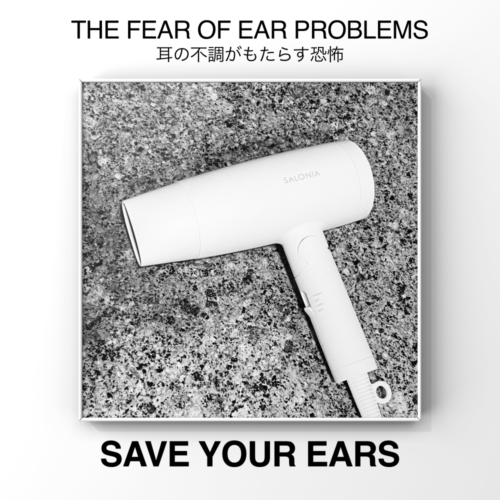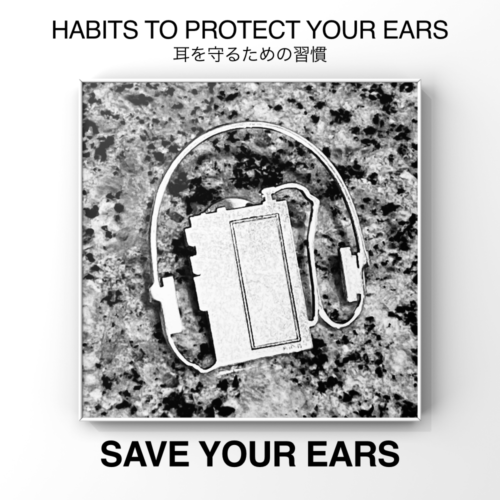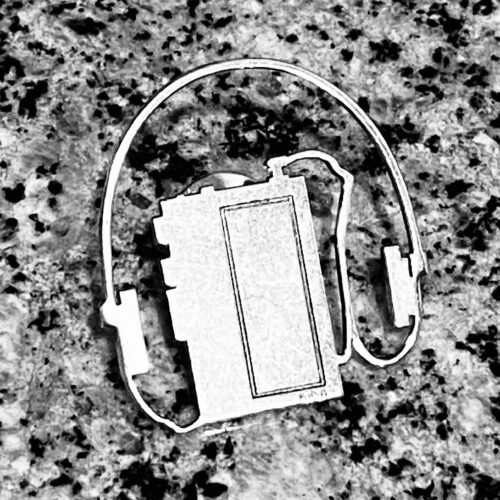CONTENTS
HEALTH CARE

THE FEAR OF EAR PROBLEMS
Do you listen to music loudly every day just because you love it? Even if you don’t have any problems with your ears at the moment, your risk of hearing loss will increase if you continue to live a life that puts a strain on your ears. Furthermore, ear problems can also cause other problems such as reduced communication skills.
EAR HEALTH SELF-CHECK
・It is sometimes difficult to hear conversations.
・I listen to music with earphones while commuting to work or school.
・I like to listen to music at high volume.
・I often use a hair dryer.
▶︎If you have even one of these, you may be having trouble hearing.
HEARING LOSS PROGRESSES UNNOTICED.
It is not the ears that actually perceive sound, but the brain. Even if your hearing is a little impaired, your brain will cover it up. This is why it is difficult for us to notice that our hearing loss is progressing.
IT REDUCES THE ABILITY TO COMMUNICATE.
As your hearing deteriorates, you are more likely to ignore what others are saying or misunderstand them more often. This can lead to people thinking that you are a strange person.
IT CAN LEAD TO LONELINESS AND EVEN DEMENTIA.
If you continue to have trouble speaking with others, you may not want to meet people and may become socially isolated. Recent studies have also shown that hearing loss can increase the risk of dementia.
REDUCE THE HABIT OF LISTENING TO LOUD NOISES.
Damage to the ear is ‘loudness of sound x time exposed to sound’. So even if you don’t have hearing loss now, your habit of listening to loud sounds will bring you closer to hearing loss as you get older.
BE CAREFUL ABOUT THE VOLUME
ON THE TRAIN.
Sound cannot be heard well unless the difference in loudness between the sound you want to hear and the sound you don’t want to hear is at least 20 digibels. Therefore, when listening to music in a noisy train, we tend to turn up the volume. To avoid this, earphones with a noise cancellation function are recommended.
AVOID PROLONGED USE OF
HAIR DRYERS.
In terms of noise in daily life, hair dryers and vacuum cleaners also require attention. In particular, 15 minutes of use of a hair dryer can exceed the daily allowance for the ears. Therefore, it is necessary to shorten the time of use or wear earplugs.
耳の不調がもたらす恐怖
音楽が好きだからといって、毎日大きな音で音楽を聞いていないだろうか? 今は耳に異常がなくても、耳に負担をかけた生活を続けると、難聴のリスクが高まる。さらに耳の不調は、コミュニケーション能力が下がるなど、他のトラブルの原因にもなるため、注意が必要だ。
耳の健康 セルフチェック
・会話が聞き取りにくい時がある。
・通勤、通学中にイヤフォンで音楽を聞く。
・大音量で音楽を聴くことが好き。
・ドライヤーをよく使っている。
▶︎ひとつでも当てはまれば、耳が聴こえにくくなっている可能性がある。
難聴は気づかぬうちに進行する。
実際に音を感知しているのは耳ではなく、脳。実は、聴力が少し落ちていても、脳がそれをカバーしてくれている。そのため、難聴が進んでいることに、私達は気づきにくいのだ。
コミュニケーション能力が低下する。
聴力が低下すると、相手の話を無視してしまったり、勘違いが多くなったりする可能性が高まる。すると、なんだか「変な人だな」と思われてしまうこともある。
孤独になり、認知症になることも。
相手と話すことがうまくいかないことが続くと、人と会うのが億劫になり、社会的に孤立しまうこともある。また、難聴が認知症のリスクを高めることが、研究でわかってきた。
大きな音を聞く習慣を減らそう。
耳へのダメージは、「音の大きさ×音にさらされた時間」。そのため、今は難聴でなくても、大きい音を聞く習慣があると、歳を重ねるにつれて難聴に近づいてしまうのだ。
電車内での音量に注意しよう。
音は、聞きたい音と聞きたくない音の大きさの差が20デジベル以上ないとよく聞こえない。そのため、騒音のある電車内で音楽を聞く際には、音量を上げがちなのだ。それを避けるためには、ノイズキャンセル機能付きのイヤホンがおすすめ。
ドライヤーの長時間使用は避けよう。
日常生活の騒音では、ドライヤーや掃除機にも注意が必要。特にドライヤーは15分の使用で、1日分の耳にとっての許容量を超えてしまうこともある。そのため、使用時間を短くしたり、耳栓をするなどの工夫が必要だ。

EAR KNOWLEDGE TO AVOID REGRETS
Music is something we listen to without much thought. Behind the scenes, our ears detect sound as vibrations, convert them into electrical signals, and our brain recognizes them as sound. Hair cells, which produce electrical signals, can be dislodged by noise and other factors, making it difficult for us to hear. In this part, I will introduce some basic knowledge about such ears.
THE BRAIN HEARS SOUNDS.
The ear is an ‘organ’ that collects, regulates, and converts sound into electrical signals. The brain is the one that actually hears. ‘Hearing’ means that both the ears and the brain are functioning well and working together.
IN FACT, SOUND DOESN’T EXIST.
To hear sound is to feel the vibrations of the air. The vibrations are converted into electrical signals in the ear, which are then transmitted to the brain, which recognizes them as sound.
UNITS OF SOUND THAT YOU SHOULD KNOW.
Digibel (dB): A unit that expresses the intensity and loudness of a sound.
Hertz (Hz): A unit for expressing the high and low pitch of a sound.
THE EAR IS AN EXCELLENT SOUND SYSTEM.
The ear is a sound system that collects sound and corrects its quality. It also protects the ear by regulating the vibrations that enter the ear.
THE BRAIN PERCEIVES SOUND IN AN EMOTIONAL AND LOGICAL WAY.
When the vibration becomes an electrical signal and reaches the brain, it passes through two routes.
①The route to recognize sounds emotionally, such as comfort or discomfort.
②The route to recognize sounds logically as a meaningful language.
People integrate these two types of information to communicate.
HAIR CELLS THAT PRODUCE ELECTRICAL SIGNALS.
In the ear, there are hair cells. When sound (vibration) enters the ear, these hairs shake and produce electrical signals that are transmitted to the brain. However, if these hairs are damaged, it becomes difficult to hear.
WE WILL NOT BE ABLE TO HEAR FROM THE HIGH PITCHED SOUND.
When there is loud noise, the hair cells are shaken too much and fall out. In particular, the hairs that detect high-pitched sounds tend to fall out first. Rest your ears for two days after listening to loud noises, such as at a live.
後悔しないための耳の知識
普段、何気なく聞いている音楽。その裏では、私達の耳が音を振動として察知し、電気信号へ変換、そして脳が音として認識するというプロセスを経ている。電気信号を生み出す有毛細胞は、騒音などで抜け落ちてしまうことで、我々は音が聞こえにくくなってしまうこともある。今回は、そのような耳に関する基礎知識を紹介する。
音を聞いているのは脳。
耳は音を集め、調整し、電気信号に変えるための「臓器」。実際に聞いているのは脳である。「聞こえる」とは、耳と脳の両方がうまく機能し、連携しているということなのだ。
実は、音は存在しない。
音を聞くとは、空気の振動を感じること。振動が耳の中で電気信号に変換され、脳に伝わり、脳がそれを音として認識するのだ。
知っておきたい音の単位。
デジベル(dB):音の強さ・大きさを表す単位。
ヘルツ(Hz):音の高さ・低さを表す単位。
耳は優秀な音響システム。
耳は音を集め、音質を補正する音響システム。耳に入ってくる振動を、整えることで、耳自身を守る機能も果たしている。
脳が音を感情的・論理的に認識する。
振動が電気信号となり、脳に到達すると、2つのルートを通過する。
①心地よさや不快など、音を感情的に認識するルート。
②意味のある言語として、音を論理的に認識するルート。
人はこれらの情報を統合し、コミュニケーションをしている。
電気信号を生み出す有毛細胞。
耳の中には、毛が生えている細胞がある。音が入ってくると、この毛が揺れ、電気信号を生み出し、脳に伝える。しかし、この毛にダメージがあると、聴こえにくくなってしまうのだ。
高い音から聞こえなくなる。
大きな騒音があると、有毛細胞が揺れすぎて、抜け落ちてしまう。中でも、高い音を感知する毛が先に抜けることが多い。ライヴなどで大きな音を聞いた後は、二日は耳を休めよう。

HABITS TO PROTECT YOUR EARS
Hearing is an essential part of listening to music. In order to maintain its function, we need to pay attention to our daily habits. Listen to music in rhythm and listen carefully to the sounds of nature. Get plenty of sleep and be careful not to eat too much oil and sugar. These actions will help protect your ears.
MOVE YOUR BODY TO THE RHYTHM.
We perceive sounds not only by their loudness and pitch, but also by their rhythm. When we feel comfortable with music, the muscles inside our ears contract and hold our eardrums in place, thus reducing the damage to our ears. In this case, swaying your body to the rhythm is more effective.
LET THE SOUNDS OF NATURE
SOOTHE YOUR STRESS.
The sound of the waves, the swaying of the leaves on the trees, the chirping of birds and insects, and other sounds in nature have a pattern that is a mixture of constant and irregular rhythms. When we are stressed, listening to these rhythms of the natural world can help us relax.
GET PLENTY OF GOOD SLEEP.
When the nerves in the brain are active, debris is generated in the brain. When this debris builds up, it can lead to tinnitus. The solution to this problem is sleep; seven to eight hours of sleep will create a large wave of blood flow that will clean out the debris.
BE CAREFUL NOT TO EAT
TOO MUCH OIL AND SUGAR.
Hearing loss and other ear problems are caused by the effects of arteriosclerosis as well as noise. Therefore, it is important not to eat too much oil and sugar. Drinking milk is also a good option if you are feeling irritable or have trouble sleeping.
SMOKING CAUSES HEARING LOSS.
The more cigarettes one smokes, the more hearing loss one tends to experience. In particular, smoking has been shown to increase the risk of hearing loss in the higher frequencies. Quitting smoking is an effective way to prevent hearing loss.
LET’S BE CAREFUL ABOUT
EVERYDAY NOISE.
Hair dryers and vacuum cleaners make a lot of noise, and since we use them daily, we need to be careful. Also, be careful when using earphones on the train, as they tend to be turned up too loud. Earphones with noise-canceling function can be useful for daily noise control.
耳を守るための習慣
音楽を聴くために、欠かすことのできない聴力。その機能を維持するためには、日々の習慣に気をつける必要がある。リズムに合わせて音楽を聞き、自然の音に耳を澄ます。たっぷり睡眠をとり、油と糖質の摂りすぎに注意する。このような行動が、あなたの耳を守ってくれるのだ。
リズムに合わせて、体を動かそう。
私たちは音を、大きさや音程のほかに、リズムでも認識している。音楽を心地良く感じている時、耳の内側の筋肉が収縮し鼓膜を抑えるため、耳のダメージが軽減される。その際、リズムに乗って体を揺らすと、より効果的だ。
自然の音で、ストレスを癒そう。
波の音や、木の葉が揺れる音、鳥や虫のさえずりなど、自然界には一定のリズムと不規則なリズムが混在したパターンがある。ストレスが溜まった時には、自然界のこのリズムを聞くことで、リラックスできるのだ。
良質な睡眠を十分にとろう。
脳の神経が活動をすると、脳内にゴミが発生する。このゴミが溜まると、耳鳴りにつながる場合もある。それを解決するのが睡眠。7〜8時間の睡眠をとると、大きな血流の波が生まれ、そのゴミを一掃してくれる。
油と糖質の摂りすぎに注意しよう。
難聴などの耳トラブルは騒音の他に、動脈硬化の影響も原因している。そのため、油や糖質を摂りすぎないことが重要。また、イライラしている、眠れない時は、牛乳を飲むのも良い方法だ。
喫煙により聴力が低下する。
煙草を吸う数が多いほど、聴力が低下する傾向がある。特に、喫煙により、高音域の聴力低下のリスクが高まる傾向がわかっている。難聴を防ぐためには、煙草を止めるのは効果的だ。
長時間のデスクワークによる耳鳴り!?
平衡感覚を保つことも、耳の役割の一つ。そのため、長時間同じ姿勢が続くと、耳の機能がうまく働かなくなり、耳鳴りがすることがあります。長時間のデスクワークの際は、体を動かしたり、耳の下の筋肉をなでることを意識しよう。
日常の騒音には注意しよう。
ドライヤーと掃除機の騒音は大きく、日々使うものだけに注意が必要。また、電車内でのイヤホンを使用する際は、音量を大きくしがちなので気をつけよう。日常の騒音対策には、ノイズキャンセル機能付きのイヤホンが役立つ。

